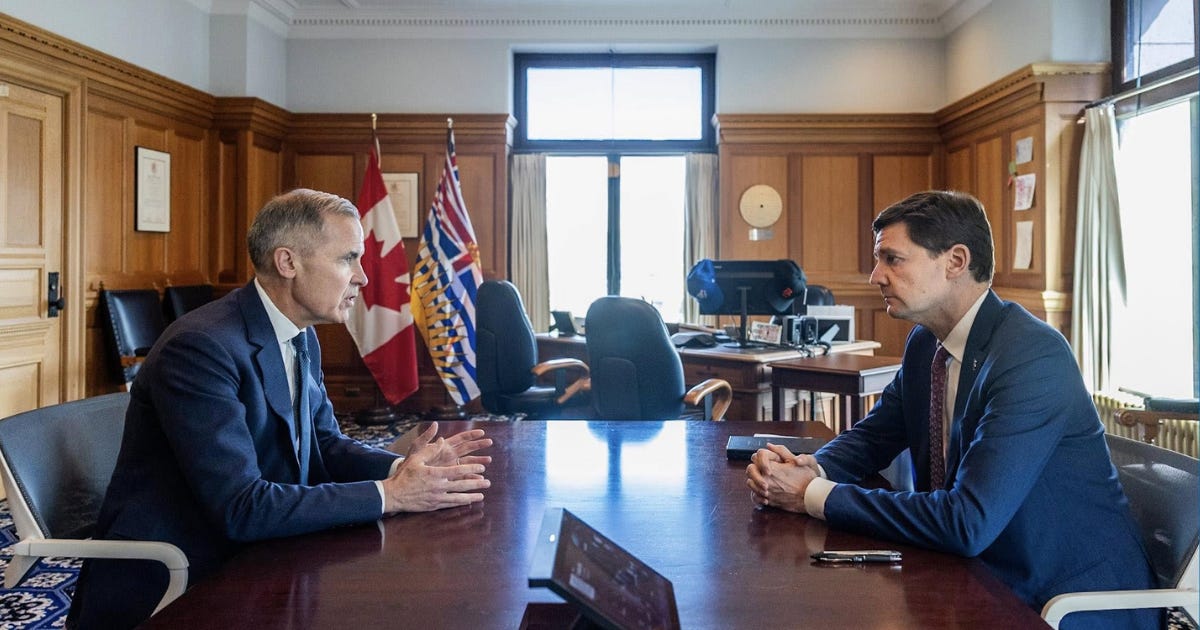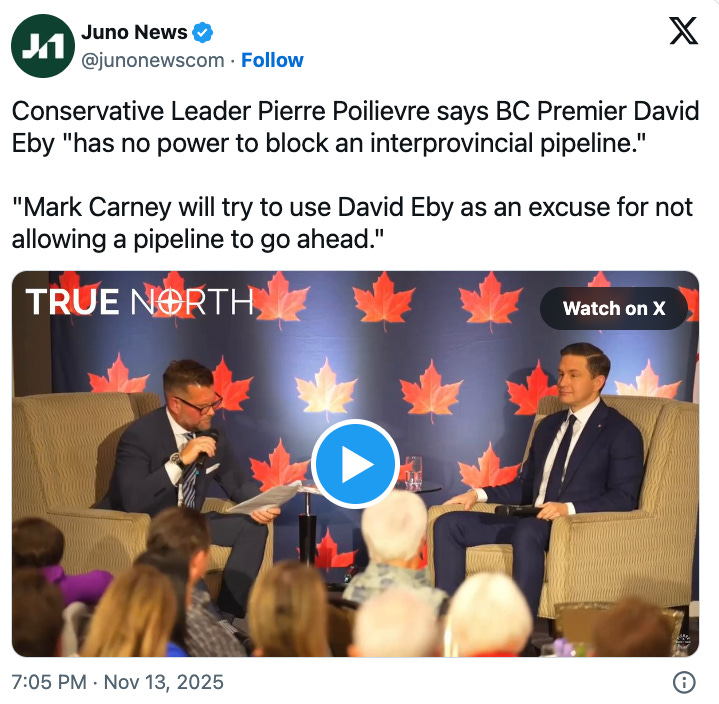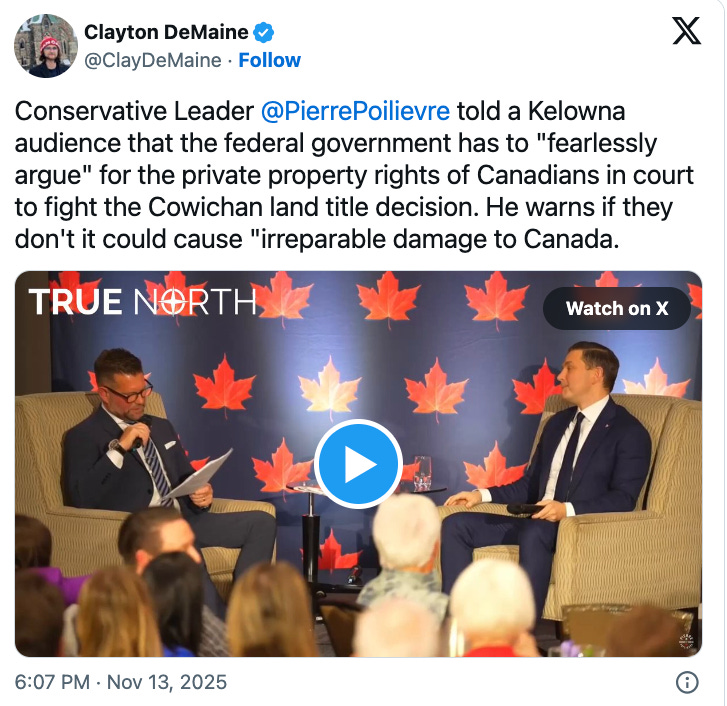Carney will use Eby as an excuse to block pipelines: Poilievre
Conservative Leader Pierre Poilievre sounded the alarm in Kelowna on Thursday: Prime Minister Mark Carney will use BC’s NDP Premier David Eby to block vital pipeline projects.
Conservative Leader Pierre Poilievre sounded the alarm in Kelowna on Thursday: Prime Minister Mark Carney will use BC’s NDP Premier David Eby to block vital pipeline projects, despite the federal government’s authority over interprovincial resources.
After delivering a speech in Kelowna, B.C., about his vision for Canada—one where the government steps aside for resource development, investment, and home building—Poilievre reiterated his position on the federal government’s role in ensuring the country’s resources reach the market to boost Canada’s economy.
“The federal government needs to do one thing to unlock our resources, and that is get out of the way. Get out of the way. We don’t need a politician in a cape to fly around like a pretend superhero,” Poilievre said during a fireside chat, referencing a series of photo shoots Carney has embarked on since assuming office. “We need liberal laws to be repealed, liberal taxes to be cut, so that our miners can make mines, our pipeliners can build pipelines, our energy workers can do their jobs.”
He noted Canada is uniquely positioned with one of the largest landmasses in the world, containing a plethora of natural resources that the government currently prevents from being harvested and sold.
“We have the resources. We have trillions of dollars of private money that desires to build these projects. The only thing stopping it is the Liberal government’s massive bureaucratic apparatus of high taxes and barriers,” he said. “So if the federal government gets out of the way, we can get these things done.”
Poilievre stated that provinces should have exclusive control over permitting projects within their borders, but the federal government has exclusive control over interprovincial projects.
“Some people say, ‘Well, David Eby is going to oppose a pipeline from Alberta to the Pacific,’ and my answer to that is, who cares? He has no power to block an intraprovincial pipeline. It is a federal responsibility,” Poilievre noted. “Mark Carney will try to use Eby as an excuse for not allowing a pipeline to go ahead. That is not an excuse. The constitution is very clear on this point, the federal government has the power to go ahead, even if the provincial government does not agree.”
Last week, Eby met with Indigenous leaders and reaffirmed their collective opposition to Alberta getting its energy to tidewater on the West Coast of Canada. Meanwhile, Alberta Premier Danielle Smith has threatened to sell more oil and gas to the U.S. amid a tariff war if the federal government doesn’t scrap its “nine-bad” anti-development laws and allow her province to sell its resources.
“Mark Carney still hasn’t stayed in his position on a pipeline to the Pacific. He still doesn’t know what he thinks on the subject eight months after taking the job as Prime Minister,” Poilievre said. “I would use my federal legal authority to rapidly permit a pipeline from Hardesty, Alberta, to Prince Rupert or Kitimat, so that we can move a million barrels of western Canadian oil to 2.5 billion energy-hungry customers in Asia.”
During the fireside chat, Poilievre was also asked to weigh in on the Cowichan tribe land title decision, which has locals in Richmond worried that their property rights are endangered, fearing they could lose their homes.
“The Federal government has to make a clear and decisive argument in the courts in favour of fee simple property rights. If we do not have fee simple property rights, our entire economy is going to collapse,” Poilievre said. “So this ruling cannot stand. Period.”
He argued that the change in land rights violates basic principles and agreements residents made when purchasing their homes, and that Conservatives would relentlessly defend their rights.
“Your land is your land. You buy a house, you own the land. It belongs to you. No one can take it away,” Poilievre said. “The federal government needs to fearlessly argue that before the courts and the judges better realize the massive irreparable damage that they will do, not only to our economy but to the future of this country, if they undermine the very basic notion of private property rights of homeowners.”







Not an excuse at all .... All planned.
Carney, Canada's fraud and liar of a PM never, ever, ever had any plans to build pipelines.
Eby is a liar a hypocrite and a fraud.
Wonder if Carney and Eby are related??
Pipelines would build up Canada.
Create thousands of jobs in primary, secondary and supply and manufacturing.
Create energy independence for Canada and its people.
The above is the antithesis of everything that are goals of The WEF, The Useless Nations, Globalists, Environmentalists and pretty much all that the EU stands for and don't forget that Carney is on the record as stating he is a "Proud European".
... IN OTHER WORDS ...
Remember .... Carney is a liar and a fraud and Eby will simply be a convenient shill but if that does not work Carney will always have Canada's Indigenous types to fall back on.
Regardless.
NO PIPELINES FOR YOU CANADA.
.................................FOOTNOTE................................................
.... BTW .... Totally hoping I am wrong.
CANADA NEEDS PIPELINES BIG TIME but if this silliness from Carney continues Alberta certainly no longer needs Carney nor Canada for that matter... {EBY is NDP and is therefore a totally lost cause}
Here we go again. The leader? In lala land pandering to the indians. Question, what is the vision that the indians have for Canada?